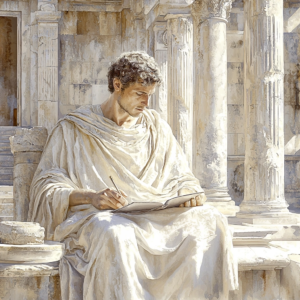Reflection: Self-Examination in Stoicism 🌿
Reflection: A Gateway to Inner Clarity and Virtue
In the Stoic tradition, reflection is not a passive act but an essential practice for self-improvement. By examining our actions, thoughts, and motivations, we align closer with the virtues that define a meaningful life. From Marcus Aurelius to less-known Stoics like Hierocles, the art of reflection has always been a cornerstone of Stoic wisdom.
The Importance of Reflection in Stoic Philosophy
For the Stoics, reflection served as a daily practice to assess progress toward virtue. Marcus Aurelius often wrote in his Meditations about the value of evaluating one’s day to cultivate wisdom and resilience. Reflection allows us to discern what we can control, ensuring we don’t waste energy on external events but instead focus on inner growth.
Lesser-known Stoics like Archedemus of Tarsus highlighted the need for self-examination as a means to avoid errors in judgment. This intentional introspection isn’t about guilt or regret but about aligning one’s life with rational principles.
Historical Insights: Reflection in the Stoic Tradition
Reflection was not limited to personal journaling; it was often a collective practice. For instance, Hierocles emphasized the idea of viewing oneself in relation to others, using reflection to strengthen connections within the cosmic community. He taught that self-examination is incomplete without considering our duties to others.
By reflecting on their interconnectedness with the world, Stoics like Hierocles and Archedemus demonstrated that true self-knowledge leads to virtuous action, benefiting both the individual and society.
Modern Applications: How to Cultivate Reflection Today
Reflection remains a powerful tool in our fast-paced modern lives. Here are practical ways to integrate it into your daily routine:
- Journaling: Dedicate 5-10 minutes each evening to jotting down your thoughts and evaluating your actions. Focus on what went well, what could improve, and what is beyond your control.
- Mindful Pauses: Take brief moments during the day to reflect on your emotional responses and align them with rational thought.
- Weekly Reviews: Set aside time to review your week’s actions, decisions, and interactions. Ask yourself: “Did I act according to my values?”
Stoic Wisdom on Reflection
“Let not your mind run on what you lack as much as on what you have already.” – Marcus Aurelius
“Examine yourself, and you will find inner peace.” – Seneca
How Will You Start Reflecting Today?
Reflection is a habit that builds self-awareness and strengthens your character. Begin by asking yourself one simple question each day: “Did I live according to my values today?” With time, these moments of introspection will lead to profound personal growth.
Please Note
Stoic exercises and practices are meant to inspire, not instruct. For personal guidance, please consult an expert. Stoic Practices: Disclaimer


